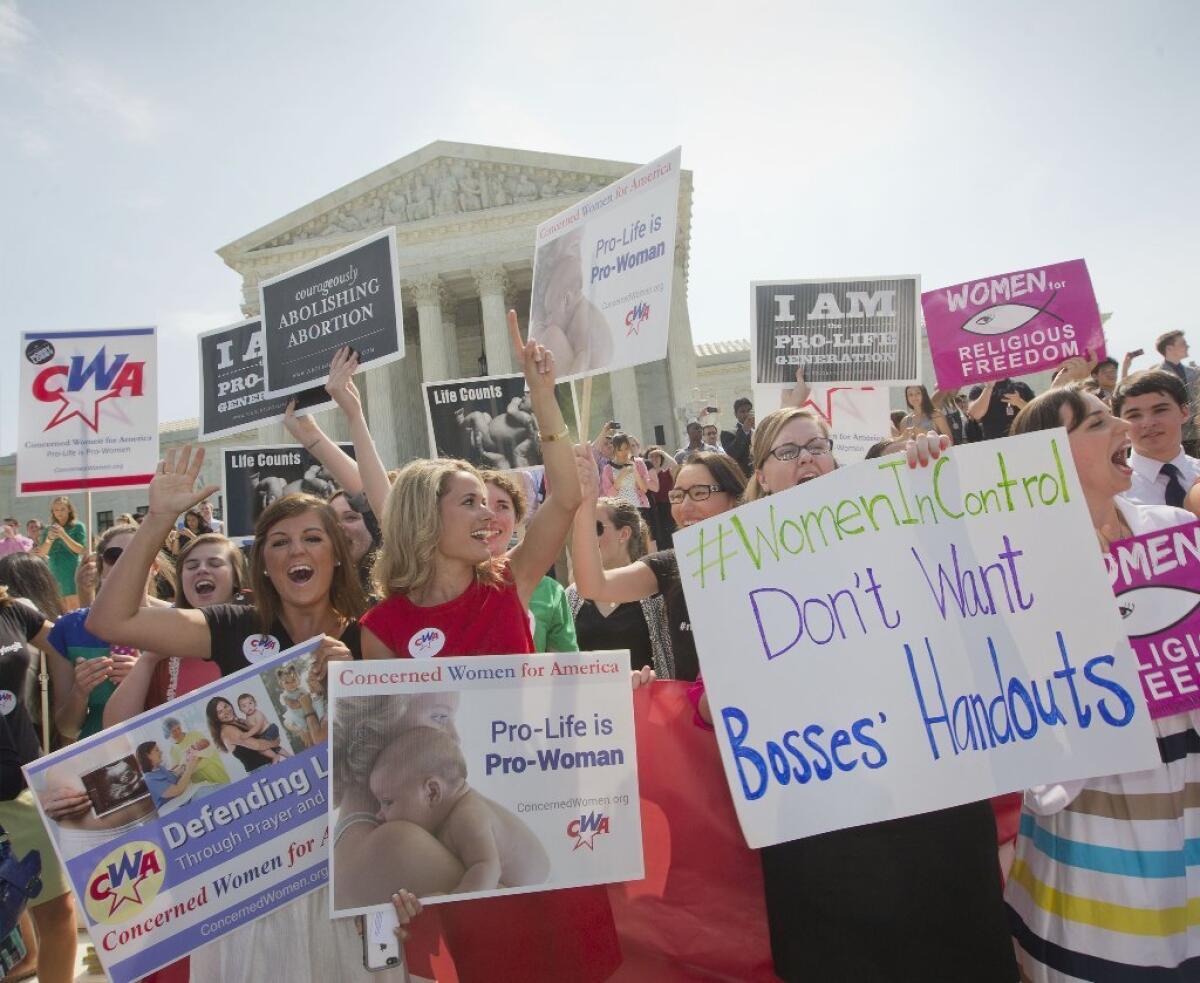Supreme Court gives some employers more leeway on birth control

- Share via
While some businesses may seize on a Supreme Court ruling to limit birth-control coverage, many employers may be reluctant to drop it from their health plans for fear of alienating female workers, experts say.
In a 5-4 decision Monday, the U.S. Supreme Court ruled that business owners with religious objections to certain forms of birth control can refuse to offer coverage for contraceptives.
The ruling was a blow to one aspect of President Obama’s signature healthcare law. The Affordable Care Act requires private health plans to cover prescription contraceptives, including all methods approved by the Food and Drug Administration.
On Monday, a majority of justices said some closely held employers, such as family-owned businesses, can opt out of the coverage if they have religious objections. The ruling doesn’t apply to publicly traded companies that employ millions of people nationwide.
It’s unclear how many business owners may eliminate this coverage and how many female employees could be affected.
Michael Caspino, a legal expert on health coverage and religious freedom issues in Irvine, said many employers will be hesitant to put themselves at a competitive disadvantage for workers.
“A lot of employers are not going to remove the contraceptive mandate because it could turn off a number of their workers and take them out of contention for getting employees,” said Caspino, chief executive of the Busch & Caspino law firm.
“This will lead to only the most stalwart business owners attempting this. I don’t see a large tidal wave across the country,” Caspino said.
Some health-law supporters who disagreed with the ruling concurred that its impact may be limited among U.S workers.
“It won’t affect the vast majority of people who have employer-sponsored health insurance since most workers are in companies that are unaffected by today’s ruling,” said Ron Pollack, executive director of Families USA, a national consumer group.
Another factor is that 28 states, including California and Illinois, have laws requiring at least some employers to cover contraceptives if they offer prescription drug coverage.
Those laws remain in effect because the Supreme Court decision dealt only with an interpretation of federal law.
The contraceptive requirement was challenged in court by a pair of family-run businesses -- Hobby Lobby Stores Inc. and Conestoga Wood Specialties Corp.
In the majority decision, Justice Samuel A. Alito Jr. said owners of closely held corporations have religious rights under federal law.
Some critics of the ruling said it sanctioned discrimination in the workplace against female employees. They said coverage as basic as birth control shouldn’t vary from one employer to another.
“Women who thought, in 2014, that their birth control coverage was secure now have to stop and consider the views of their bosses. That is truly outrageous,” said Debra L. Ness, president of the National Partnership for Women & Families.
Other consumer groups expressed concern that the court ruling could open the door for employer challenges to a wide array of other health services that many workers consider routine.
“A corporation might use a religious reason to not provide coverage for blood transfusions, vaccinations, anti-depressants or other medical treatments,” said Anthony Wright, executive director of Health Access California, a consumer advocacy group.
Caspino, the Irvine lawyer, said those concerns may be overblown and the justices in the majority signaled that the ruling shouldn’t be interpreted that broadly.
“I don’t think we will see a slippery slope,” Caspino said.
Public opinion has generally been in favor of the contraceptive coverage requirement on employers.
In a recent poll, 53% of people surveyed said the contraceptive coverage rule should apply to for-profit companies, even if it violated owners’ religious beliefs. Forty-one percent said employers that object should not be subject to the requirement, according to the Kaiser Health Tracking Poll.
More to Read
Inside the business of entertainment
The Wide Shot brings you news, analysis and insights on everything from streaming wars to production — and what it all means for the future.
You may occasionally receive promotional content from the Los Angeles Times.











